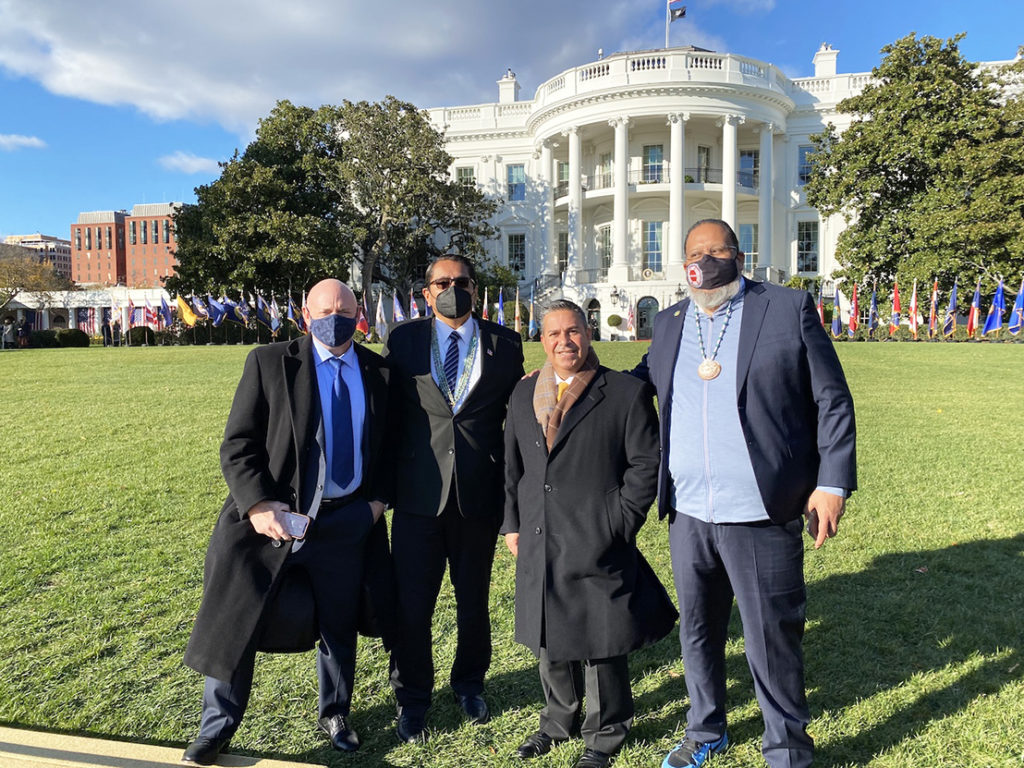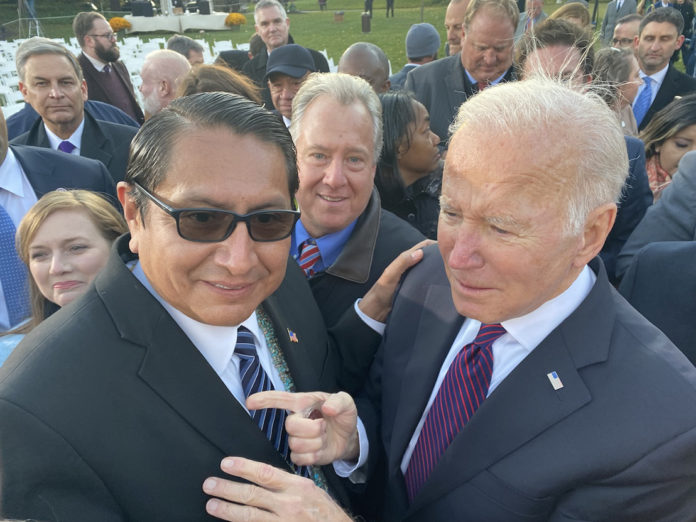WASHINGTON, D.C. – Navajo Nation President Jonathan Nez joined U.S. President Joe Biden, Vice President Kamala Harris, key cabinet members, and Congressional members at the South Lawn of the White House for the signing of the $1.2 trillion Infrastructure Investment and Jobs Act.
“It was truly an honor to be invited to the White House to represent the Navajo people for this monumental signing of the Infrastructure Bill, which will invest more than $11 billion in Indian Country for transportation, broadband, energy, water and sanitation facilities, and climate resiliency,” said President Nez. “This measure will also fully fund the Navajo Utah Water Rights Settlement Act to provide much-needed water resources for Navajo people. We thank President Biden, Vice President Harris, Speaker Pelosi, Congressional leaders, and our entire Congressional delegation for coming together to pass another historic measure that invests in native communities. We also acknowledge and thank the 24th Navajo Nation Council for their support and advocacy for the bill.”

Major highlights include:
- Provides the Reclamation Water Settlement Fund with $2.5 billion to fully fund existing Indian Water Rights Settlements.
- Authorizes over $3 billion for the Tribal Transportation Program over five years with an additional $925 million for the Tribal Transportation Facility Bridges program (23 U.S.C. § 202(d)) over five years as supplemental appropriations.
- Authorizes $2 billion for the NTIA Tribal Broadband Connectivity Program and extends the deadlines for use of funds, removes the restriction that funds can only be used during the COVID-19 pandemic, and allows for new and subsequent funding rounds for additional appropriations.
- Provides $3.5 billion over five years for improvements and construction of IHS sanitation facilities under Indian Health Service Sanitation Facilities Construction Program.
- Provides $11.2 billion for grants to States and Tribes for abandoned coal mine land and water reclamation projects. Tribes with programs approved under Section 405 of the Surface Mining Control and Reclamation Act of 1977 are eligible to receive grants.
- Provides $55.426 billion for State and Tribal Assistance Grants for purposes of providing clean and safe drinking water to communities.
- Provides $6 billion for the Battery Material Processing Grant and Battery Manufacturing and Recycling Grant programs that will distribute grants with extra consideration given to eligible entities that partner with Indian tribes.
“Infrastructure is the primary building block of our communities,” said Navajo Nation Vice President Myron Lizer. “This investment will not only help rebuild roads and bridges our people need to access basic services, but it will lay the foundation for many communities who will see broadband or water delivery for the very first time. We thank Congress and the Biden-Harris Administration for working together on this initiative.”
The infrastructure funds will help to build on the success of the CARES Act funds, which allowed over 700 Navajo families to receive electricity, over 300 off-grid solar installations, 117 water and waste water upgrades and replacements, 105 water cistern system installations, 30 waterline connections to homes, 139 broadband installations and upgrades, and four new broadband/cell phone towers, and hardship assistance for Navajo people. Legislations are also being developed to provide another round of hardship assistance and infrastructure development/improvements using funds from the American Rescue Plan Act.
The U.S. House of Representatives passed H.R. 3684, the Infrastructure Investment and Jobs Act on Nov. 5 by a vote of 228-206. The Senate voted 69-30 to pass the infrastructure in August.














































